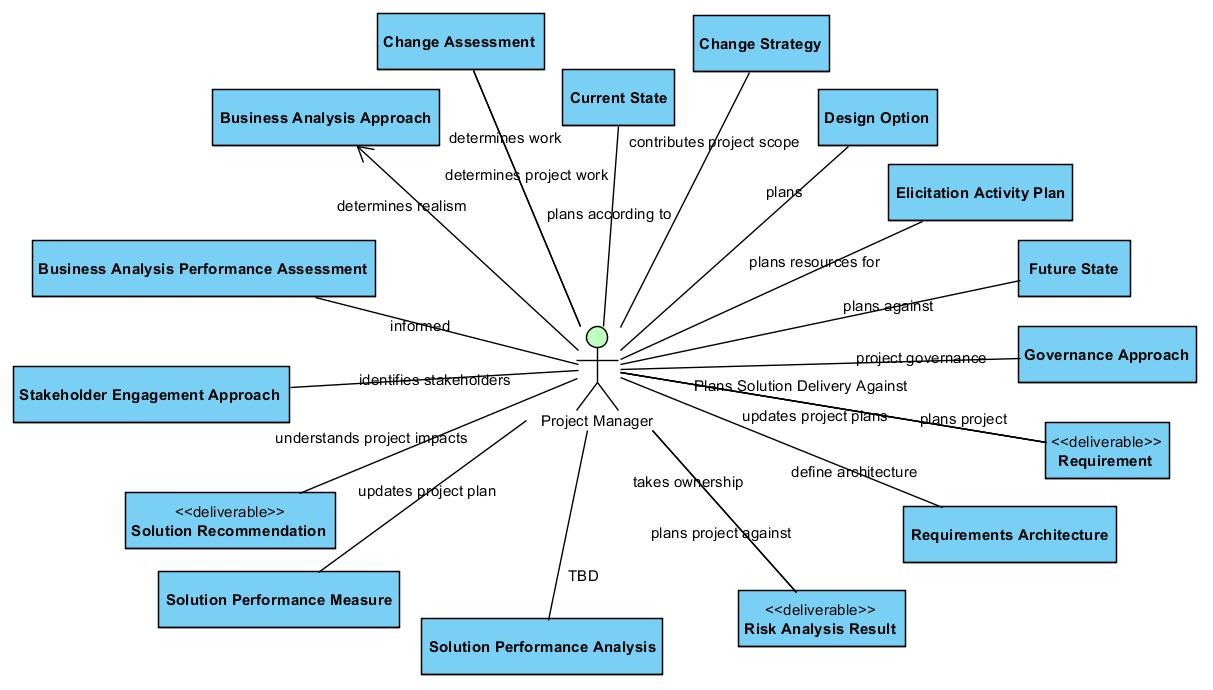Project Manager
Manages the business process initiative and is accountable for its delivery and for driving decisions. The project manager is responsible for planning, scheduling, communication management, change management, risk management. They manage the work required to deliver a solution that meets a business needs, and ensure that the project's objectives are met while balancing the project factors such as scope, budget, schedule, resources, quality, and risk. Alternate roles names might be project
lead, technical lead, product manager, or team leader.


BABOK References
This is a list of references to the project manager role in the BABOK:
Determines that the approach is realistic for the overall schedule and timelines. The business analysis approach must be compatible with other activities.
May be able to identify and recommend stakeholders.
Responsibility for stakeholder identification and management may be shared with the business analyst.
Works with the business analyst to ensure that overall project governance aligns with the business analysis governance approach
Is accountable for the success of a project and must be kept informed of the current status of business analysis work. If potential problems or opportunities for improvement are identified, the project manager must be consulted before changes are implemented to assess whether those changes will have an impact on the project. They may also deliver reports on business analysis performance to the sponsor and other stakeholders.
Ensures that the appropriate people and resources are available to conduct the elicitation.
Within a project, responsible for overall risk management and may participate in risk analysis for new or changed solutions.
Responsible for managing the schedule and tasks to perform the solution measurement. For solutions already in operation, this role may not be required.
Manages the selection process so that when effecting the change they are aware of potential impacts on those supporting the change, including the risks associated with the change.
Plans and manages the solution definition process, including the solution scope and any risks associated with the proposed solutions.
May assist in defining and confirming the requirements architecture.
Within a project, responsible for overall risk management and may participate in risk analysis for new or changed solutions.
Responsible for managing the schedule and tasks to perform the solution measurement. For solutions already in operation, this role may not be required.
May assist in defining and confirming the requirements architecture plans and manages the solution definition process, including the solution scope and any risks associated with the proposed solutions.
Manages the selection process so that when effecting the change they are aware of potential impacts on those supporting the change, including the risks associated with the change.
Responsible for managing change and planning the detailed activities to complete a change.
In a project, the project manager is responsible for the project scope, which covers all the work to be performed by the project team
Helps to assess risk and is primarily responsible for managing and mitigating risk to the project.
Might have input on what is a reasonable and manageable desired future state. may use information on current state as input to planning
Traceability supports project change and scope management.
Reviews the requirements change assessment to determine if additional project work is required for a successful implementation of the solution.
Responsible for identifying and managing risks associated with solution design, development, delivery, implementation, operation and sustainment.
The project manager may manage the project plan activities pertaining to review and/or approval.
Ensures that the appropriate people and resources are available to conduct the elicitation.